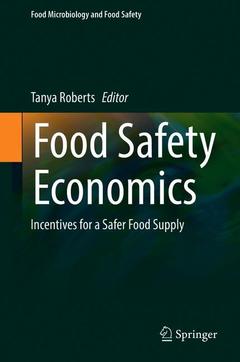Food Safety Economics, 1st ed. 2018 Incentives for a Safer Food Supply Practical Approaches Series
Langue : Anglais
Coordonnateur : Roberts Tanya

This book examines the economic incentives for food safety in the private marketplace and how public actions have helped shape those incentives. Noted contributors analyze alternative public health protection efforts and the benefits and costs associated with these actions to understand:
- why an excess of foodborne illness occurs
- what policies have worked best
- how regulations have evolved
- what the path forward to better control of pathogens in the U.S. and the international food supply chain might look like
While the first third of the book builds an economic framework, the remaining chapters apply economics to specific food safety issues. Numerous chapters explore economic decision making within individual companies, revealing the trade-offs of the costs of food safety systems to comply with regulations vs. non-compliance which carries costs of possible penalties, reputation damage, legal liability suits, and sales reduction. Pathogen control costs are examined in both the short run and long run.
The book's unique application of economic theory to food safety decision making in both the public and private sectors makes it a key resource for food safety professionals in academia, government, industry, and consumer groups around the world. In addition to Benefit/Cost Analysis and economic incentives, other economic concepts are applied to food safety supply chains, such as, principal-agent theory and the economics of information. Authors provide real world examples, from Farm-to-Fork, to showcase these economic concepts throughout the book.
Part 1.- Food Safety Applied Economics: Economic Incentives in Regulations and in the Private Sector.- Overview of Food Safety Economics.-
Information Is the Basic Problem for Economic Incentives.- Supply Chain Control, Principal-Agent Theory, and International Challenges HACCP Implementation, Economic Incentives, and Benefit/Cost Analysis: U.S. Meat and Poultry.- Economic Impact of Posting Restaurant Ratings: UK and US Experience.- Part II. Economics of Foodborne Illness Metrics: When to Use What.- Overview of Estimates and Use by Private Companies and Public Policy Analysis - Robert Scharff, Arie Havelaa.- Burden of Disease for Cost Effectiveness Analysis.- Cost of Illness and DALY Methods and Applications.- Identification of Acute Foodborne Illnesses and Their Long Term Health Outcomes.- Part III Case Studies in Applied Food Safety Economics.- Economic Incentives of Product Testing: U.S. Beef.- Surveillance of Campylobacter in New Zealand.- Outbreak Consequences: Sweden’s Salmonella Testing from Farm to Fork.- Economics of Antibiotic Use in Swine and Poultry Production.- The Role of Surveillance in Regulations and in Promoting Economics Incentives.- Economic Incentives for Capacity Building in Food Safet.- Pathogen Information and Supply Chain Performance: Costs and Benefits.- Legal Liabilty Changes for Food Safety in the United States and Selected Countries.- The Challenges and Promise of GFSI in International Markets.- Part IV.The Future of International Food Safety: Economic Incentives, Risks, GFSI, WTO, and Country Regulations.
Tanya Roberts has been involved in five Congressional reports and hearings, including testifying on the costs of foodborne illness and writing a benefit/cost analysis of food irradiation. She has been an invited speaker at UN conferences and meetings in North America, Europe, Asia, Africa, Australia and New Zealand. While at the Economic Research Service in USDA, Dr. Roberts analyzed the private sector’s innovations in response to the 1993 Jack in Box outbreak and led the slaughterhouse team in USDA’s risk analysis of E. coli O157:H7 in ground beef. The interaction of the private sector with food safety public policy is Dr. Roberts main research interest, both nationally and internationally. Both in ERS and in the economics profession, Dr. Roberts has pioneered economic analysis of food safety policies.
Examines the economic incentives for food safety in the private marketplace and how public actions have helped shape those incentives Explores economic decision making within individual companies to understand the tradeoffs of the costs of food safety systems to comply with regulations Applies economic theory to food safety decision making in both the public and private sectors
Date de parution : 01-2019
Ouvrage de 411 p.
15.5x23.5 cm
Thèmes de Food Safety Economics :
© 2024 LAVOISIER S.A.S.



